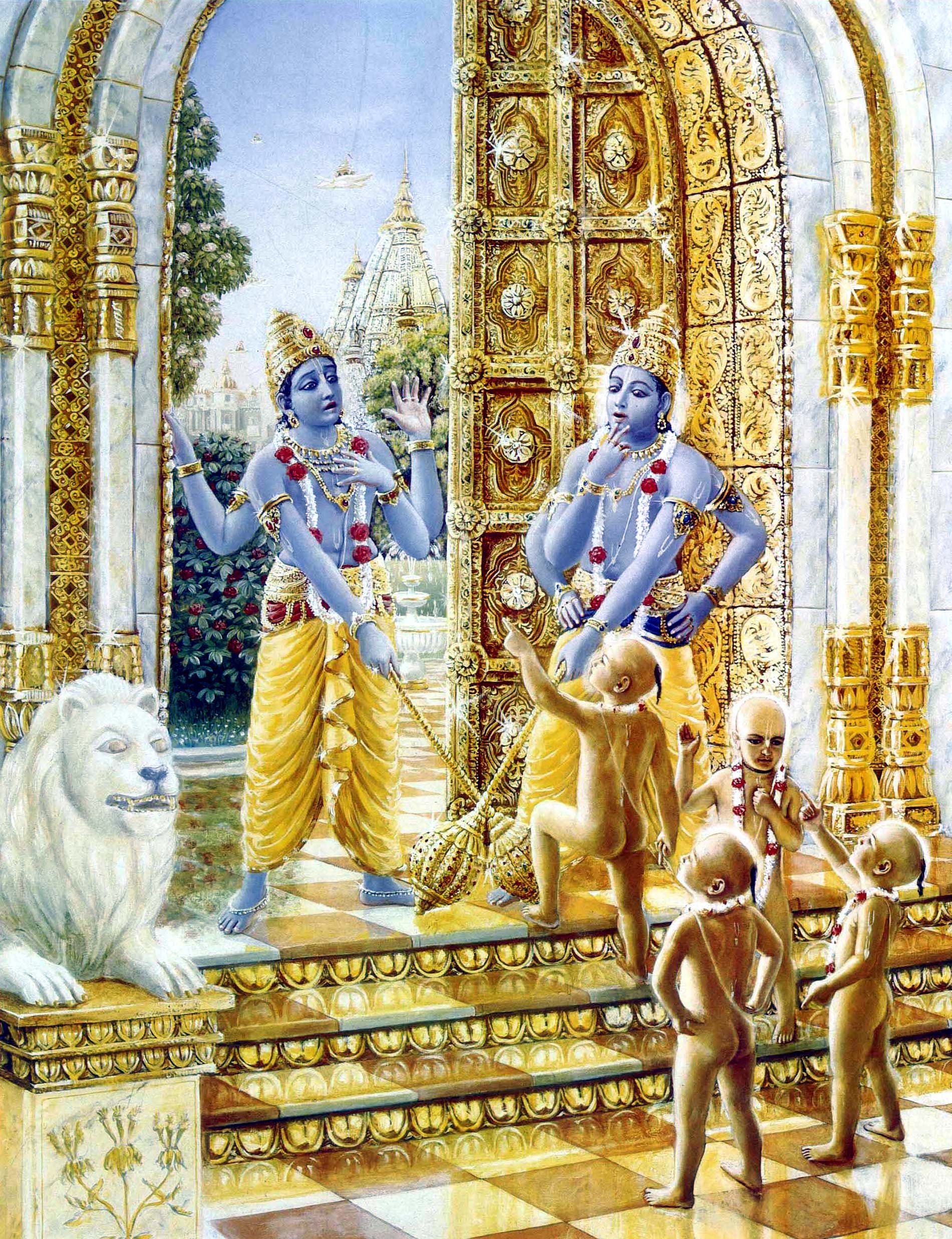Lord Brahma was shown a glimpse of the eternal and supreme abode Vaikuntha, by Supreme Lord Narayana at the time of the creation of the cosmos when Brahma satisfied Lord Narayana by the penance after being born on the lotus emanated from the navel of Lord Narayana (Vishnu).
According to the Bhagavata Purana, which is considered to be the essence of vedic knowledge and the greatest of all puranas[need quotation to verify][not in citation given], this event is described as follows:The Personality of Godhead, being thus very much satisfied with the penance of Lord Brahma, was pleased to manifest His personal abode, Vaikuntha, the supreme planet above all others.
This transcendental abode of the Lord is adored by all self-realized persons freed from all kinds of miseries and fear of illusory existence. In that personal abode of the Lord, the material modes of ignorance and passion do not prevail, nor is there any of their influence in goodness.
There is no predominance of the influence of time, so what to speak of the illusory, external energy; it cannot enter that region. Without discrimination, both the demigods and the demons worship the Lord as devotees.
Vishnuloka, Vaikuntha (Sanskrit वैकुंठ, vaikuṃṭha), Vaikuntha-loka, Brahmaloka- or Abode of Brahman,Brahmajyoti, Param Padam (supreme abode), or Paramapadam is the home of the Supreme Lord Vishnu.
It is the eternal abode of Narayana or Vishnu or Hari, his consort Lakshmi, and Shesha, upon whom they rest.[not in citation given] In most of the extant Puranas, and Vaishnava traditions, Vaikuntham (Vishnuloka) is located in the direction of the Makara Rashi (Shravana Zodiac) which coincides with the Capricorn constellation.
Vishnu's eye is supposed to be located at the South Celestial Pole as well. The Rigveda (1.22.20) states, Oṃ tad viṣṇoḥ paramam padam sadā paśyanti sūrayaḥ: "All the suras (devas) look towards the Supreme Abode of Lord Vishnu", referring to Vaikuntha, the Supreme Abode.
Vaikuntha is considered by Vaishnavites to be the ultimate destination of souls who attain moksha or liberation.[citation needed]Vaikuntha is known as Paramdhama where liberated souls dwell for eternity enjoying pure bliss and happiness in the company of God Narayana or Vishnu.
Vaikuntha is beyond the periphery of the material universe and hence, cannot be perceived or measured by material science and logic.[citation needed]Ksheera Sagara or Ocean of milk is known to be the topmost realm in the material universe where Sheshashayee Lord Vishnu rests on Ananta Shesha.
Cosmologically, the Ksheera Sagara is supposed to be situated to the South of the Jambudvipa-globe (the Earth-sphere), and is depicted as being in the Southern Hemisphere in related Hindu Cosmography (Cartography).
It is also sometimes known as local Vaikuntha of the material universe which is approachable by devas or demigods in order to meet Lord Vishnu in case of any emergency or disturbance in the equilibrium of the universe. Vaikuntha itself, is beyond the material universe and so is free from the universal creation and annihilation which happens again and again.
Do:
- Do pray your Ishta Devata before pilgrimage to Temple.
- Do contact Temple Devasthanam information centre for enquiry, temple information and for Pooja details etc.
- Do reserve your travel and accommodation at Temple well in advance.
- Do bath and wear clean clothes before you enter the temple.
- Do concentrate on God and Goddess inside the temple.
- Do maintain silence and recite your Istamantram to yourself inside the temple.
- Do observe ancient custom and traditions while in Temple.
- Do respect religious sentiments at Temple.
- Do deposit your offerings in the hundi only.
Don't s:
- Do not come to Temple for any purpose other than worshipping of God and Goddess.
- Do not smoke at Temple.
- Do not consume alcoholic drinks at Temple.
- Do not eat non-vegetarian food in the Kshetram.
- Do not approach mediators for quick Darshanam. It may cause inconvenient to others.
- Do not carry any weapon inside the temple.
- Do not wear any head guards like helmets, caps, turbans and hats inside the temple premises.
- Do not perform Sastanga Pranama inside the Sanctum Sanctorum.
- Do not take much time while performing Sparsa Darshanam to God in Garbhagriha.
- Do not buy spurious prasadams from street vendors.
- Do not encourage beggars at Temple.
- Do not spit or create nuisance in the premises of the temple.
